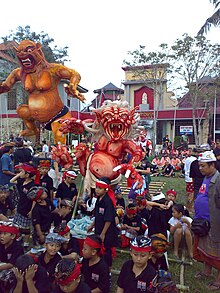Nyepi
Nyepi is the Balinese "day of silence", of fasting and meditation . It is the highest Hindu holiday in Bali and a common holiday in all of Indonesia . Nyepi is not only celebrated in Bali, but sometimes also in other parts of Indonesia where a Hindu minority lives, e.g. B. in East Java and West Lombok .
Nyepi is celebrated the day after the new moon during the spring equinox (Nyepi 2020 on March 25th ). Nyepi describes the first day of a new year according to the traditional Balinese moon phase calendar Saka . Nyepi is also known as the "Balinese New Year ".
procedure
The Nyepi celebrations stretch over several days:
Melasti (3 days before Nyepi)
During the Melasti ceremony , sacred objects ( arca , pratima and pralingga ) are brought from the temples in a procession to the nearest water point (sea, lake or river), where the statues are purified (by the power of the water god Baruna ). The deeper meaning of the ceremony is the purification of nature, but also the amerta (source of eternal life) to be gained from the water.
Tawur Kesanga (day before Nyepi)
The day before Nyepi there is an actual exorcism ceremony. Carnival-like processions are held on the main street of the respective villages (the imaginary meeting point of the demons ). Here are Ogoh-Ogoh -called puppet carried, which symbolize all evil spirits. In the evening the celebrations culminate in the Ngerupuk , where the Ogoh-Ogoh's are burned with great noise. The purpose of the ceremony is to banish all evil spirits from the villages and the lives of the believing Balinese in order to restore a balance between the gods, the people and nature.
Nyepi
Nyepi starts at 6 a.m. and lasts until 6 a.m. the following day. During these 24 hours, the following rules must be strictly observed:
- Amati lelanguan (no festivities): absolute silence, fasting, no pleasures of any kind
- Amati lelungan (travel ban): it is not allowed to leave the houses
- Amati karya (work ban ): no work is allowed
- Amati geni ( ban on fire): no fire, no light
The devout Balinese spends the day in meditation (tapa / yoga brata) .
These rules are strictly observed in Bali. There are no radio or television stations broadcasting to Nyepi. The airport is interrupted for all air traffic, there is not a single vehicle on the roads (except for emergency vehicles). No pedestrians are tolerated on the streets or on the beaches. There is a great silence over the entire island, in the evening and at night it is almost completely dark. So-called pecalang , religious police officers dressed in black and white checked sarongs , patrol the streets and monitor compliance with the rules. The observance of the rules (at least the ban on going out) is also expected of the tourists.
Nyepi's deeper meaning is a new beginning in the greatest possible purity. The practiced self-control should lead to spiritual purity. Another interpretation by Nyepi is that the silence and darkness are intended to trick the passing demons and evil spirits into believing that the island is deserted, so that they move on and people are saved from their bad influence.
At Nyepi 2018 the mobile internet was switched off in Bali and the international airport remained closed.
Ngembak Geni (day after Nyepi)
At Ngembak, the Balinese visit each other to ask for forgiveness and thus start the new year cleanly. Social life is resumed. The devout Hindu also spends the day studying ancient scriptures, songs and poems.
Web links
- www.indo.com , accessed March 11, 2013 (English)
- I Wayan Juniartha, The Jakarta Post, Denpasar , March 6, 2008
- www.balifriend.net , accessed on March 11, 2013 (English)
- www.essortment.com , accessed March 11, 2013 (English)
- www.sunda-islands.com Lexicon , accessed March 11, 2013
- www.homeiswhereyourbagis.com
Individual evidence
- ↑ Even the Internet is silent in Bali. Tagesschau, March 17, 2018

